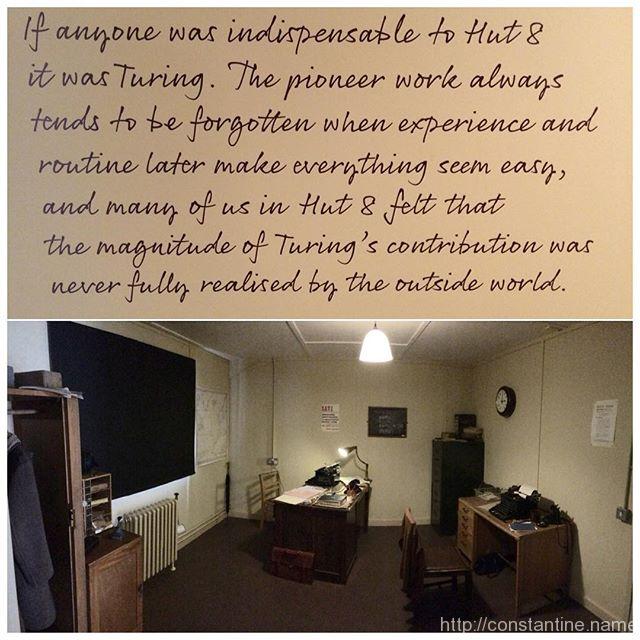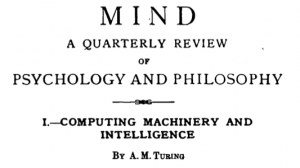Alan Turings office. *drops the mic*
ɕ

Alan Turings office. *drops the mic*
ɕ
First successful Turing Test: First Turing Test success marks milestone in computing history
ɕ

Here is the 2013 Super Bowl Dodge Commercial, “God Made a Farmer.”
https://youtube.com/watch?v=GdR5TOhHJGM
Here is the recent spoof, “God Made a Sysadmin.”
Obviously the ‘farmer’ video is a commercial. It intends to stir up empathy and appreciation for hard work, solid work ethics, traditional American values, (and perhaps some spirit of ‘rally around the under-dog,’) and then the corporation hopes everyone will associate those positive characteristics with their product. (This is also known as, ‘Intro to Marketing.’)
The ‘sysadmin’ video is a spoof. It engenders a healthy dose of pride, enables those who work in the profession to smile at the references, and to have a bit of winsome fun.
Both professions entail difficult work, (the type of difficulty is of course different,) and have clear work ethics. Without the farmers, or without the sysadmins, life as everyone knows it would end rather quickly.
The average person will understand all of the things which the farmers are said to do, but will understand almost none of those things which the sysadmins are said to do.
Sysadmins like to think, and I’ve said this myself, that they are part of a profession with a “long” history. In reality, computers and the profession are in their infancy. We have just 70-ish years of history if we measure from Alan Turing’s ideas, and we have just three different generations of people who have worked in our profession.
If we want to be treated as professionals, if we want to be individually granted a measure of respect based on our chosen profession the way farmers, doctors, and (some) lawyers are, then we must continue to work hard as we have done for 70-ish years.
We also need to work hard to raise awareness of our profession. We need to work together more, as a community of people, rather than an archipelago of individuals. We need to take better care of ourselves; We must not sacrifice our own physical and mental health at the alter of short-term advancement. We need to work to solve the larger problems — the ones which aren’t even system administration problems, but which are organizational, societal and philosophical problems — which put many of our fellows into untenable situations.
Our profession has a long way to go.
ɕ

My background is not in Computer Science. (My background is in Engineering; More in About.) I happily stumbled, more or less backwards, into network and systems administration. Although I’ve always had the analytic and scientific skills for this work, I’ve had little education, formal or otherwise, on the theoretical side. Recently I was delighted to find a survey-level CS column in the Communications of the ACM.
Reading CS classics widens your perspective by introducing stable, timeless ideas. You escape the popular themes of your times and evaluate the field from a more literal position. You learn about the qualities that make a person a great scientist. You realize those people are delighted to think over problems. By learning the history of computers and studying the lives and works of eminent computer scientists we all recognize the true merit of being part of such a respectful profession and privileged community.
~ Selma Tekir from, Reading CS Classics, Communications of the ACM, Vol. 55 No. 4
slip:4uaoma3.
I dutifully queued the reference list for assimilation, and eventually I arrived at the following. If you’re a dyed-in-the-wool computer scientist, you surely see where this is going, and I encourage you to start laughing at me at this point.
I propose to consider the question, ‘ Can machines think ? ‘ This should begin with definitions of the meaning of the terms ‘machine’ and ‘think’. … Instead of attempting such a definition I shall replace the question by another, which is closely related to it and is expressed in relatively unambiguous words. The new form of the problem can be described in terms of a game which we call the ‘imitation game’.
~ Turing, A. M. I from, Computing machinery and intelligence, MIND LIX, 236 (1950)
I had to hand type a URL to figure out that “MIND” is a “quarterly review of psychology and philosophy”, and “LIX” was the volume number. This quoted article being from volume 59, issue number 236, circa October 1950. That’s a tri-axel dump-truck load of awesome in one citation.
HAH! Clueless me. This is THE article by Alan Turing. <me, stands gawking in awe>
ɕ